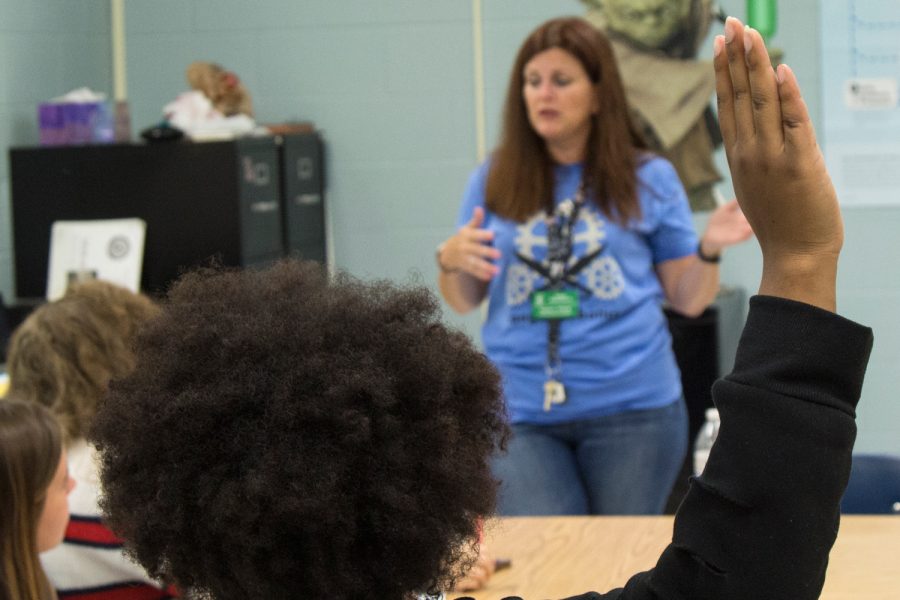A Welcomed Change
Students welcome AP Seminar as Spectra replacement
Lizzie Dailey-LeFlore raises her hand to ask teacher, Ms. Flood, a question about her independent oratory project.
November 2, 2018
Walking into room 96 for second hour, junior Lizzy Dailey-LeFlore is nothing but smiles. She walks towards room and on her way in greets Mrs. Karen Flood who stands outside the door in the hallway everyday. Dailey-LeFlore walks into the room to quite a scene. Sitting at the tables around the room are 11 students all enrolled in AP Seminar.
Dr. William Vanderpool, director of alternative learning at FHSD, has been in charge of gifted education for the past four to five years, and has decided to make a few changes at the high school gifted program level. Spectra was drastically dwindling at the high school level due to many developments in the district.
“[The district] saw over the years the decline in students participating in programs at the high school level. And a big part of that was because of all of the great opportunities they had. So more AP classes, the Project Lead The Way stuff, there’s just a lot of different options,” Dr. Vanderpool said.
The district needed something to keep the balance of Spectra but also open it up so more students could have the opportunity to keep the program alive.
“What’s exciting to me is we’re not having to give up something, we’re actually just making it better and stronger,” Dr. Vanderpool said.
Spectra is no longer taught at the high school level and is replaced by the AP Capstone program which is open to all students to take, not just gifted students.
“This class came about because the
College Board has been asked to come up with a presentation and research skills class,” Ms. Flood said. Ms. Flood is the former Spectra teacher and the current AP Capstone teacher. She also teaches Spectra at Saeger Middle School.
The goal of the class is to allow students to immerse themselves in projects of their interest while learning proper research techniques, presentation skills, collaborative learning and identifying good questions.
These are the skills the College Board deemed necessary in order for students to be college and career ready, making this program more vital in preparing students for the future.
“Colleges recognize this as an advanced research and presentation class, so they know that the kids are coming there are going to be equipped with the skills that they need to be successful in college,” Ms. Flood said.
The first year of the two-year course is called AP Seminar. In this class students learn the proper skills of research at the college level while getting to participate in passion projects. In this class, a teacher does not assign you a topic, but rather lets you choose a topic you want to learn about.
The first year of the program is a stepping stone for the second year, where there is even more freedom for students to choose what to research and how to present it.
At the end of the two year program students who pass the class and AP test are eligible to receive an AP Capstone diploma at graduation, a very prestigious honor that few students receive.
FHSD is lucky to be one of the few districts in the state to pilot this program in schools and among the 1,100+ high schools across the country introducing the program. The program is being launched in all three high schools and the district is hoping to have enough students for a second year course in the 2019-20 school year.
According to Dr. Vanderpool, it took three years to get the program accepted and installed in the district. This was due to the request by the district to enroll all three high schools.
“It took a little while for AP to accept all three schools for the program because it was a pilot for them initially, and we were lucky enough to get it rolling this year,” Dr. Vanderpool said.
Dailey-LeFlore, and fellow student Jacob Radwanski, a sophomore at FHC, both regard the class as a great way to better prepare them for college.
“The environment is very supportive, and they make you feel comfortable,” said Dailey-LeFlore.
Many of the activities being done in the class require group work. Having a class that is comfortable with each other helps produce better group work results.
Radwanski later also regards the class as welcoming.
“I think [the class] will improve my work, and it will teach me how to present my ideas very clearly and efficiently,” Radwanski said.
The point of the class is to not make students comfortable, but uncomfortable to where they must problem solve and think for themselves.
“I am looking forward to hearing their final presentations. I know I am hoping that my students are more confident speakers, that they feel more confident in their research abilities, and that they’re ready to take these college level classes that are looking for that autonomous work,” Ms. Flood said.



